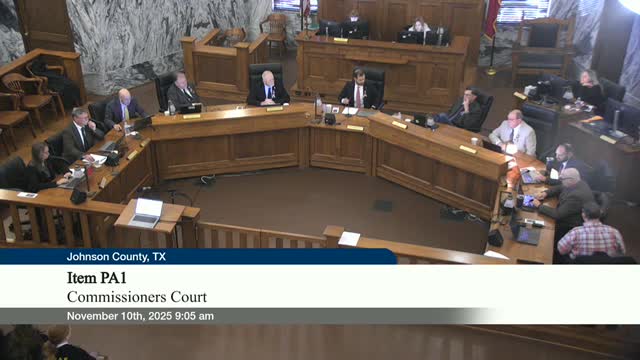Grandview FFA Frames Local Debate Over Biosolids as County OKs Outside Counsel for EPA Appeal
Get AI-powered insights, summaries, and transcripts
Subscribe
Summary
Johnson County Commissioners Court, Johnson County — On Nov. 10, 2025, a team from the Grandview High School FFA told the Johnson County Commissioners Court that biosolids — treated sewage sludge applied to farmland — bring both agricultural benefits and serious public‑health concerns to local communities.
Johnson County Commissioners Court, Johnson County — On Nov. 10, 2025, a team from the Grandview High School FFA told the Johnson County Commissioners Court that biosolids — treated sewage sludge applied to farmland — bring both agricultural benefits and serious public-health concerns to local communities.
"Are biosolids fertilizing the future or contaminating the present?" asked Sarah Foyt, one of the student presenters, summarizing the two opposing views the team put before the court. The FFA team said some farmers see biosolids as a low-cost, nutrient-rich soil amendment that raises yields and reduces fertilizer costs; neighbors and local testers, the students said, have reported odors, livestock illness and very high levels of PFAS in some samples.
The presentation described claims from both sides. Charlie Miller, identified in the presentation as a herd manager, said yield maps show increased corn yields in treated areas and that biosolids can reduce fertilizer costs. "These increased yields would mean more abundant and high quality feed for my cattle," Miller said, arguing for agricultural benefits.
Other presenters urged caution. Campbell Gross said independent laboratory testing (Eurofins) and veterinary testing at Texas A&M found extremely elevated PFAS concentrations in animal tissue near a biosolids field. Gross told the court that a stillborn calf carried "660,000 parts per trillion of PFAS in its liver" and a week‑old calf carried "610,000 parts per trillion" in its tissue. The students also cited news coverage and regulatory scrutiny in other counties and states.
The students referenced federal and state regulatory frameworks during their talk; the presentation specifically mentioned the transcript reference to "the part 503 rule for the 1972 Clean Water Act" as the set of standards biosolids must meet, and noted critics argue those standards do not fully address emerging contaminants such as PFAS.
After presentations and public discussion, the court went into executive session to consult with counsel on pending litigation involving biosolids. When the court returned to open session, Commissioner Woolley moved that Johnson County accept a litigation representation agreement with Public Employees for Environmental Responsibility (PEER) — a pro bono arrangement offered to assist the county and co‑plaintiffs in appealing a U.S. District Court decision related to an Environmental Protection Agency motion to dismiss. The motion, which authorized County Judge Chris Boetticher to sign the agreement, carried unanimously.
The action does not itself change local regulation of land application. Instead, the representation agreement places the county and its co‑clients under outside counsel for the appeal process in federal court. Judge Boetticher and several commissioners thanked PEER and local law‑enforcement partners for their assistance in the matter.
Why it matters: PFAS (per‑ and polyfluoroalkyl substances) are persistent in the environment and have been linked in some studies to adverse health effects. The county’s decision to accept outside counsel is an active legal step that preserves Johnson County’s ability to participate in appellate briefing and arguments about federal regulation and enforcement related to biosolids. Local farmers and residents told the court sharply different stories about the practice; the FFA presentation illustrated how the issue divides rural communities.
What’s next: The county will participate in the appeal with PEER as lead or co‑counsel; the appellate timetable will follow federal court procedures. The FFA students were scheduled to compete in a district contest following the presentation.
